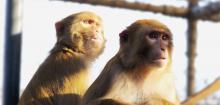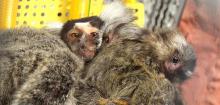On 30 April last, Prof. Jaak Vossen passed away at the age of 81. Prof. Vossen worked at the Leiden University Medical Center as a paediatrician from 1968 and as professor of Paediatrics with a chair in paediatric immunology from 1979 to 2002.
Laboratory animal research lies at the basis of first potential malaria vaccine
07 May 2019 | Back to News, Publications and Annual ReportsPrecisely in the 2019 World Immunization Week, on 23 April, the malaria research community announced hopeful news (in Dutch). The news marked the roll-out of a large-scale pilot with the first malaria vaccine. ‘The vaccine should provide partial protection to children in Malawi against the deadly parasite.’
BPRC takes new step in animal-free innovations
15 Apr 2019 | Back to News, Publications and Annual ReportsBPRC has already made great strides in the development of alternative research methods. Now our experts have come another step closer to this objective, with the engineering of an animal-free method to detect impurities in new types of medicines – impurities that can cause dangerous side effects.
Is a new flu vaccine closer or actually further away?
05 Apr 2019 | Back to News, Publications and Annual ReportsNot every runny nose means you have flu. It's only after you've actually contracted the flu virus that we call it flu. During an average flu epidemic in the Netherlands, this happens to about half a million people. The majority of them recover within a couple of weeks, but some people can develop very serious complications. In the Netherlands, people in risk groups can be vaccinated against flu, but the current flu vaccine is under pressure – literally and figuratively.
Last Friday 29 March, two news shows made by the Netherlands Broadcasting Corporation (NOS) broadcast a news item about animal experiments, the NOS Journaal for adults and the Jeugdjournaal for children. In order to make these items they visited BPRC, prompted by the news that the number of animal experiments will be gradually decreasing in the coming years.
Dutch kids's TV show 'Zapp Buitendienst' visits BPRC
21 Mar 2019 | Back to News, Publications and Annual Reports‘It's like a zoo in here’
This week, Dutch children's TV programme Zapp Buitendienst is zooming in on animal experiments. That's something we at BPRC know all about. Series presenters Nienke and Sosha came to visit and took a look behind the scenes so they could give their viewers the full story. This episode of the popular kid's show aired Friday March 22 on NPO 3 at 5:45 pm.
There was good news two weeks ago for the fight against depression and obsessive-compulsive neuroses. This article (in Dutch) on the online knowledge platform Nationale Zorggids (National Care Guide) describes how scientists have managed to change brain activity in monkeys, 'meaning that ultrasound could possibly be used to treat depression and other brain disorders in the future'.
'We still know very little about dementia'
14 Mar 2019 | Back to News, Publications and Annual ReportsHugo de Jonge, the Dutch Minister of Health, Welfare and Sport, announced last month that he would be making additional funds available for dementia research. He intends to double the budget (€48 million) that has already been set aside until 2020 for addressing dementia. De Jonge is convinced that better treatments need to be developed. 'It is well on its way to becoming the number-one public disease,' he said in this television programme.
How the innate immune system in humans and monkeys is regulated identically
14 Mar 2019 | Back to News, Publications and Annual ReportsResearchers in BPRC's Alternative Methods Unit have discovered a new route for regulating the innate immune system. This is important, because many therapies for serious diseases focus on either activating or inhibiting the immune system.
Marmosets and their offspring: twins are better than triplets
01 Mar 2019 | Back to News, Publications and Annual ReportsDid you know that marmosets often have twins? And triplets? And sometimes even quadruplets?!
This species is known for its striking white ear tufts. These little primates weigh around 350 grams on average and live in stable extended families. (In this report, we describe how they live together.) Usually there is one monogamous breeding pair, which often has twins or triplets.











